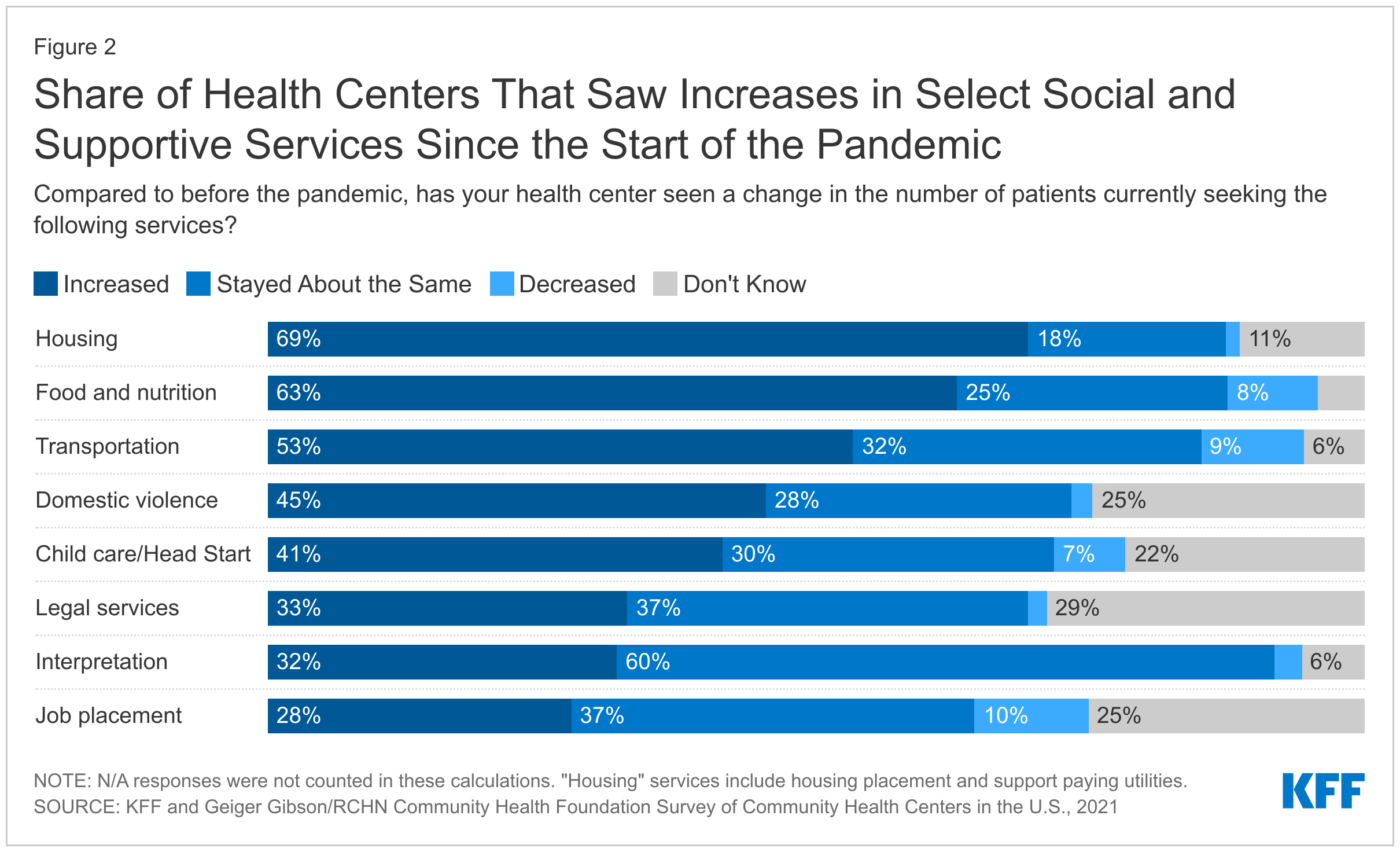Community health centers are a national network of safety-net primary care providers serving low-income, medically underserved communities. In addition to providing comprehensive primary care services, health centers have aided in national, state, and local responses to the coronavirus pandemic by providing a range of services designed to slow the spread and lessen the severity of COVID-19. Based on findings from a national survey of health centers, this brief examines how the pandemic has affected health center patients and services as well as the ongoing challenges health centers and their patients face. Key findings include:
Impact of the Pandemic on Health Center Patients and Services
- Health centers increased their use of telehealth services in response to the pandemic. The pandemic necessitated a rapid expansion of health centers’ telehealth services as patients avoided in-person care due to the risk of infection, federal guidance to avoid nonessential care, and social distancing requirements. While in-person visits have rebounded, health centers’ use of telehealth services continues to be higher than before the pandemic.
- Health centers reported an increase in the number of patients seeking housing, food and nutrition, and transportation services due to the economic disruptions caused by the pandemic. Health centers provide a range of social and supportive services to complement primary care. Compared to before the pandemic, over half of responding health centers said they saw an increase in the number of patients seeking housing services, food and nutrition services, and transportation services. A majority of responding health centers reported providing health literacy (71%) and transportation services (63%) on-site, while at least four in ten reported providing SNAP, WIC, or other nutritional services (44%) and healthy food options, such as a food pantry or meal delivery (42%), on-site.
- In the wake of a growing need for mental health and substance use disorder (SUD) services during the pandemic, health centers added new services. Since the start of the pandemic, 64% of health centers reported adding at least one new mental health or SUD service (including new telehealth options). However, health centers indicated that staffing shortages and patients’ inability to access services through telehealth (e.g., due to lack of internet access or computers/phones) as the most common challenges to providing mental health and SUD services.
- The share of health centers providing medication-assisted treatment (MAT) for treating opioid use disorder (OUD) increased during the pandemic. Roughly half of health centers (48%) saw an increase in patients with OUD compared to the start of the pandemic. The number of health center patients nationally who received MAT for OUD grew by 27% from 2019 to 2020, spurred by an infusion of federal grants for behavioral health services at health centers in the years leading up to the pandemic and the ongoing need for these services.
Key Issues to Watch
- Health centers face ongoing challenges recruiting and retaining staff and financial implications related to changes to the 340B Drug Discount Program. Among responding health centers, recruiting new employees and retaining current employees were cited as top challenges by 78% and 54% of responding health centers, respectively, and are consistent with challenges reported in previous years. Looking ahead, health centers may face financial challenges as they transition out of the pandemic. A majority of health centers reported that certain actions by pharmaceutical manufacturers and pharmacy benefit managers (PBMs) related to access to and reimbursement for 340B drugs have had a negative effect on revenue.
- The unwinding of the Medicaid continuous enrollment requirement could lead to coverage disruptions for many health center patients and revenue declines for health centers. The loss of Medicaid coverage among health center patients could lead to an increase in uncompensated care costs for health centers. At the same time, the temporary infusion of federal COVID-19 grant funding for health centers will end and federal funding for some programs that helped health centers during the pandemic, such as the HRSA COVID-19 Uninsured Program, faces an uncertain future.


Thanks for sharing. I read many of your blog posts, cool, your blog is very good.